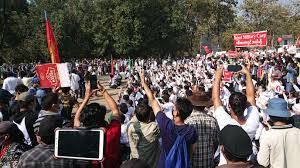Guyana Looks to Learn from Venezuela as its Massive Oil Project Kicks Into Action
Axel Sontgerath,
Staff Writer
The oil mining and production behemoth ExxonMobil is expected to begin oil production in Guyana in 2020, reports The Conversation. Its plan is to drill seven new deep-water wells to mine crude oil.
Production could exceed 1 million barrels per day over the next decade, says The Conversation, making Guyana a top ten crude producer from non-OPEC countries. Life is expected to change dramatically for the small South American country, which is perched just North of Brazil and neighboring Venezuela.
The Norwegian research firm Rystad Energy stated that the collective volume of major projects receiving final investment decisions (FIDs) this year could swell past 46 billion barrels of oil, Chron reports. ExxonMobil’s massive offshore development in Guyana plays a part in 2019’s megaprojects for the oil industry and could rake in billions of subcontracting profits in the coming years.
The deal is expected to increase Guyana’s GDP from $3.4 billion in 2016 to $13 billion by 2025, reports Hellenic Shipping News. The agreement consists of the state receiving about half of all ExxonMobil’s oil revenue, while Guyana’s half of the revenue will come after the company’s exploration costs are repaid.
Around 40 percent of Guyana’s 800,000 citizens live in poverty, and the country lacks sturdy service industry infrastructure. This deal could provide the economic boost the population needs, says Hellenic Shipping News.
Nonetheless, Hellenic Shipping News reports that Guyana’s rice and sugar farmers worry about government neglect and a decrease in interest in agricultural investment. They also worry that that oil wealth in their country will fuel political corruption. The experience of their geographic neighbor Venezuela, which is in the midst of an economic and political crisis that stemmed from governmental overdependence on an oil-based economy, fuels this fear.
The Conversation says that Guyana is right to fear Venezuela’s fate. The Guyanese government does not have an exceptional record of prioritizing measures of transparency or limiting public corruption. The government is also indebted, so it could be inclined to overspend their share of ExxonMobil’s revenue. Guyana could fall victim to “the resource curse;” the idea that a beneficial resource could have negative impacts on a country.
Furthermore, says The Conversation, high oil revenues reduce the need to collect taxes from citizens. This can create a “no representation without taxation” effect, when governments use real or anticipated economic windfalls to fund social programs that placate citizens. In turn, this reduces both popular demand, and a government’s willingness to provide actual democratic representation. From this lack of representation stems a blooming corruption issue where elected leaders use oil income as a means to bolster their political funds and buy votes instead of earning them. Ultimately, Oil-funded governments can become less accountable to their citizens.
According to StarBroek News, there are numerous other governmental weakness in Guyana. There are tensions along ethno-political lines, as the People’s National Congress (PNC) and the People’s Progressive Party (PPP) struggle for power in the country. The PNC has retained control of the government despite a lack of public support and an ability to hold command in office. This has created a languid governmental system that is struggling to find its identity. This unsteady leadership has made experts suspect that the “resource curse” could haunt Guyana, as it did in Venezuela.
According to The Conversation, the trick is to use sustainable commodity revenues to protect existing industries as a backstop for the volatile oil market.
A possible recommendation, argues The Conversation, is to invest in sovereign wealth funds. Norway, the United States, Kuwait, and the UAE all used this strategy to construct a liquefiable buffer to draw from when oil prices fell in 2014. These funds are essential in order to stabilize government budgets against global fluctuations in oil prices.
This strategy requires a high degree of governmental discipline to quell the urge to spend all the funds at once. To supplement this tactic, the Guyanese government has made steps to keep their spending in check. In January, Guyana’s National Assembly approved a bill that would create a sovereign wealth fund, which the finance ministry says is a “national imperative” to avoid the resource curse, says The Conversation.
The Conversation further reports that the Guyanese government will publish quarterly and annual reports on expenditures from this sovereign wealth fund. All withdrawals from the fund will also be subject to parliamentary approval.
Guyana has already joined several international coalitions, including the Extractive Industries Transparency Initiative and the New Petroleum Producers Group, which offer voluntary guidance and transparency requirements to help countries manage their commodity wealth soundly.
If this system of checks and balances stays intact, and the government can discipline its spending effectively, Guyana may be able to avoid the resource curse, avoid the downfall of its neighbor Venezuela, and slingshot itself up the leaderboard of South American energy producers.

